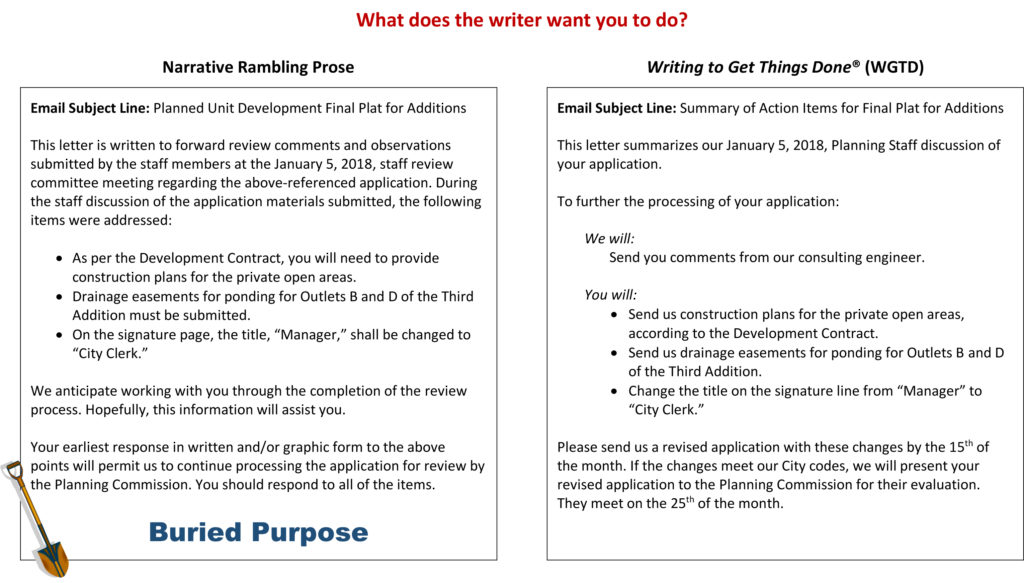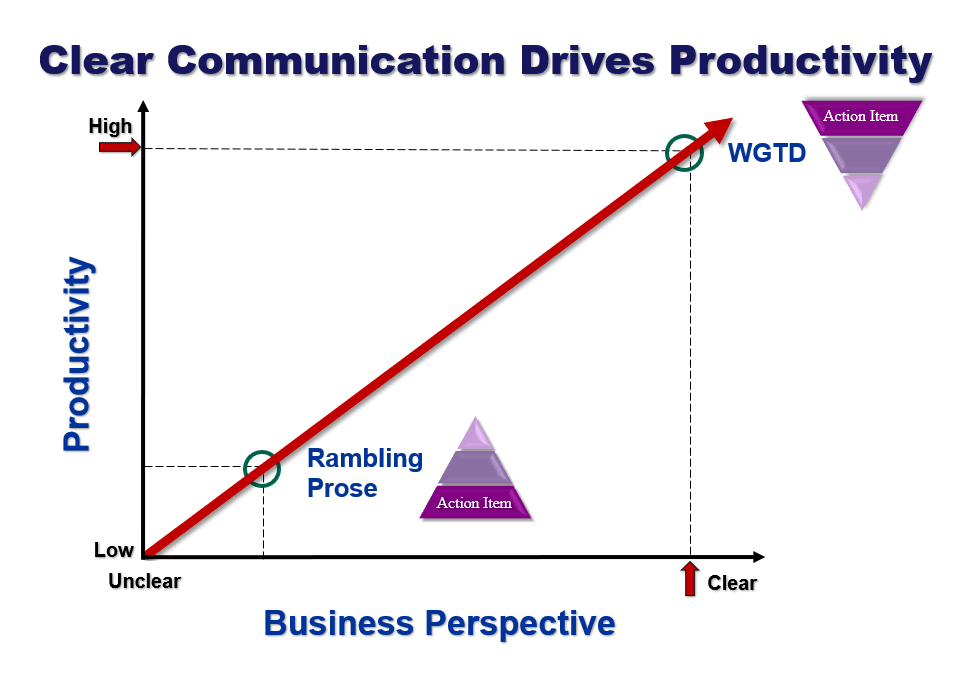Conclusion
This case study is a universal study of all organizations that strive toward excellence through successful leadership. What’s needed is a powerful, transformational experience that unleashes peoples’ potential to be the dynamic communicators they envision themselves to be: in control and having a good time getting things done in the spirit of shared cooperation and excellence. To reach this state of finding a clear, useful voice, leaders at all levels must:
- Unlearn much of what they’ve been taught
- Undo much of what they do
Summary
Since 1990 the City of Richfield has been enrolling employees in Writing to Get Things Done® (WGTD). The improvement in communication and increase in productivity led them to require all consulting contractors’ employees to take the course as well. The City’s Terms of Consultant Agreement states, “All consultant staff identified to provide services to the City will be required to complete a Writing to Get Things Done® (WGTD) writing seminar offered by Berry Writing Group at their own cost.” When an organization and its partners are all writing to get things done, things get done quickly and correctly.
Writing to Get Things Done® (WGTD) helped the professionals at the City of Richfield and its consulting contractors become better leaders by becoming better communicators. Delivering good news or bad news is situational. Successful leaders navigate circumstances with confidence, offering clear compelling explanations that earn respect and get things done. There is no reason you cannot do the same. The WGTD seminar has a 100% success rate. Come be part of it!
The City’s Mission for Excellence
The City of Richfield, an innovated suburb of Minneapolis/St. Paul, MN, prides itself on delivering the highest quality of life for its community. The City’s mission is to constantly strive to use “innovative and cutting-edge solutions” to solve problems of governance by “providing the most experienced and trained personnel” possible.
The City’s drive towards excellence was challenged by the need to improve the clarity of its written and spoken communications—communications that often resulted in confusion. The results of this confusion were that time was wasted, resources were not maximized, opportunities for collaboration were lost, clear leadership was missing, and people’s expertise at all levels was not fully utilized. Inefficiency was inevitable. These results extend beyond the City of Richfield. They are universal to every organization we’ve worked with—at every level of management.
“Writing to Get Things Done® (WGTD) revolutionized the way we communicate internally, with our colleagues, and to our stakeholders, saving us time and providing a more effective way to get our messages and needs across. What I learned during the workshop I was able to put into practice immediately and began seeing more responsive results from day one. Best course I have taken in a very long time.”
–Kristin Asher, Director of Public Works, City of Richfield
Challenge to Achieving Excellence
One challenge inherent in government agencies–as in all organizations–is clear written and spoken communications. The City of Richfield realized that its success in solving issues was dependent on its staff’s ability to communicate clearly… specifically, to use communication as a tool for getting things done, solving problems, meeting important deadlines, keeping projects on target, and creating a spirit of cooperation.
Cause of Communication Challenges
The cause of these communication challenges is two-fold: Academia and Rambling Prose.
Unlearning Academia. Writing a term paper is not like writing an email or business report. Students are taught in school to write for teachers for the purpose of showing competency for a grade—not to write to colleagues in business for the purpose of getting things done. From grammar school to graduate school, students are taught to write narratives (term papers, book reports, essays, research papers, etc.) that tell a story. But these kinds of documents have nothing to do with getting things done.
When reading an email, one of the first questions readers in business ask is “Do I have to do anything, and if so, what?” The fact that the answer to this pressing question is often buried in a multi-paragraph narrative like in an essay or book report—or is absent altogether in the form of FYI—leads to the second cause.
Undoing Rambling Prose. People write as they type at the keyboard, following their stream of consciousness. This Rambling Prose Process leads to emails and other documents in which most of the content is not easily accessible to the reader. In other words, readers are left to figure out for themselves what to do, why/how to do it and when to do it.
Rambling Prose plays the game of… Let the readers figure it out!
Adapted from WGTD Online Course
Illustration of Academic/Narrative Rambling Prose vs. WGTD
As you can see in the illustration below, WGTD is not only easier to read, but also easier to write. Writing to Get Things Done® (WGTD) saves time for everyone.
Adapted from the Writing to Get Things Done® (WGTD) Seminar
This exhibit illustrates the difference between a pre-seminar writing sample and the writing skills taught in WGTD: framing content for busy readers.
It also illustrates the challenges inherent in the narrative story writing style taught in schools. Although the difference between these two examples is stark, it is by no means unusual. It is, in fact, universal in all organizations around the world. People unwittingly paragraph each other into confusion to the point where readers stop reading.
Two-Prong Solution
The City solved its communication challenge in two ways:
- Educating its employees
- Mandating education requirements for its contractors’ employees
Prong One: Educating City Employees
For the last 28 years the City has used the Writing to Get Things Done® (WGTD) seminar to create a critical mass of city employees who are writing clear, easy-to-read internal and external communications.
The focus of WGTD is on writing the kind of documents that are crucial for running businesses or municipalities successfully. Examples include:
- Emails to residents
- Recommendations to city council members
- Work documents, RFPs and SOWs to contractors
- Emails to city project applicants
- Emails between supervisors, colleagues, and subordinates
- Recommendations to management
- Meeting minutes
- Research reports
- Updates
- Policies and procedures
The results of this training made it clear to the City of Richfield that the emails, proposals, technical reports, engineering updates, etc. of the City’s consulting contractors were in dire need of improvement.
Prong Two: Educating City Contractors’ Employees
The City of Richfield found its own communications improving to such an extent that it required the same from its consultants, the companies hired to work on City engineering projects.
As a result, many of the major engineering companies who’ve won bids in the City’s Consultant Pool have complied with this mandate by creating a critical mass of their own employees who are writing to get things done. The City’s most important contractors have conducted multiple WGTD seminars at their office locations with great success including:
- Advance Engineering & Environmental Services (AE2S) in offices located in Maple Grove, Grand Forks, Fargo, and Bismarck.
- Short Elliott Hendrickson (SEH) in offices located in St. Paul, St. Cloud, Delafield, and Denver.
“WGTD provided the top 28 drivers of my Central Region Leadership Team with a clear process to get results. From a simple process comes clear thinking, clear writing and clear results. Excellent training!”
–Tracy L. Ekola, PE, Vice President, SEH
- WSB & Associates with corporate office located in Golden Valley.
“In 2010, with an engineering staff of 150 professionals, I was hoping to improve our communication skills to better serve our clients’ needs and create an edge with our competition. WGTD surpassed our expectations. It taught us to be brief, to the point…not only in our written but also oral communications. After all these years, we still have an item on our department meeting agenda for someone to give a Writing to Get Things Done example…so it lives on throughout WSB & Associates!”
–Pete Willenbring, PE, Vice President, WSB & Associates
- Bolton and Menk with office located in Burnsville
WGTD is Battle-Tested in its Preparation to Solve Communication Problems
The Writing to Get Things Done® (WGTD) program created success for the City of Richfield through a long, rich history of many successes.
First, over the past 28 years it has improved the clarity of communication of many other metro municipalities. These have included the city governments of:
- Bloomington
- Brooklyn Park
- Crystal
- Eden Prairie
- Edina
- Minneapolis
- St. Paul
Second, for the past 15 years The Minnesota Chapter of the American Public Works Association, the primary source of professional consulting expertise for city public works projects, has offered Writing to Get Things Done® (WGTD), numerous times, with great results as it enables effective communication for the successful leadership of its members.
Third, during the last 40 years over 100,000 participants from Fortune 500 companies have used WGTD to make their employees more successful leaders.
We would love to help your company create the same success!
What You Can Do to Help Your Organization Be More Successful
Become a more effective leader through communicating more successfully by unlearning what you’ve been taught and undoing what you do.
Check to see if you are:
- Burying what you want to get done in narrative academic paragraphs
- Using the Rambling Prose process
- Beginning emails with the starting blocks of Rambling Prose, such as:
- “Enclosed please find….”
- “The purpose of this email is to….”
- “Per your email….”
- “In confirmation of our phone call.…”
- Ending emails with the exit strategy of Rambling Prose, such as:
- “Your prompt attention to this matter is greatly appreciated.”
- “Please respond at your earliest convenience.”
- “Thank you in advance for your cooperation.”
- “If you have any questions please don’t hesitate to contact me.”
Improve the Communication of your Organization by using the Writing to Get Things Done® (WGTD) online course. Or call us to talk about adding WGTD to your Leadership Development curriculum.
Your leaders and their teams will thank you. We promise.
This is what our seminar sessions look like: people working with a learning buddy and in small groups. This facilitates the learning curve beyond belief.
Our Program Design Drives Excellence
Writing to Get Things Done® (WGTD) is a learning and development process, not a training event. The following activities ensure mastery of this program and the success of your leaders.
Adapted from the Writing to Get Things Done® (WGTD) Seminar
Pre-seminar Analysis
Prior to the seminar, each participant submits a writing sample for review. We suggest ways to highlight key ideas and simplify the organizational style. This analysis and feedback prepares participants with specific writing skills/learning objectives to work on and makes the transfer of learning quick and easy.
Seminar Session
The focus is on improving participants’ actual on-the-job writing skills. Participants are amazed at how quick and easy it is to rewrite their pre-seminar writing samples using our feedback and seminar content as a guide to write more clearly.
Follow-up Support
In keeping with our commitment to creating successful leaders, we offer numerous resources and opportunities to help seminar participants become more productive and successful. We are very excited about our soon-to-be-released Student Resource Center which will offer customized software, Writing Tips, and job aids.
A Visual of Writing to Get Things Done® (WGTD)





